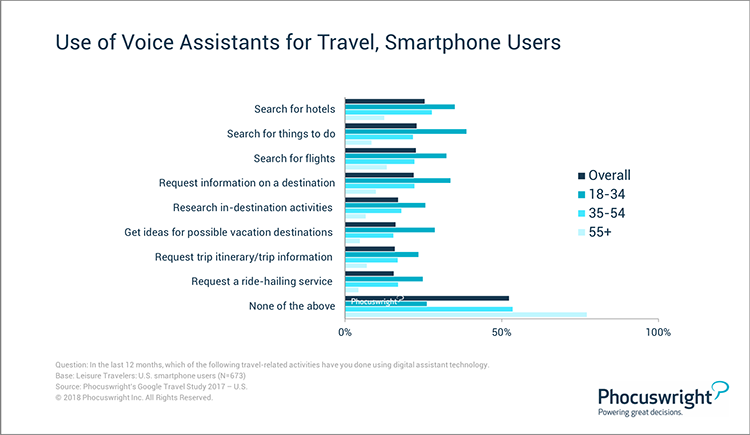Voice still "unskilled" for travel planning
- Published:
- July 2018
- Analyst:
- Michael Coletta

For all the skills in Amazon's Alexa voice marketplace (30,000 and counting), the majority can still be described as "unskilled" for travel planning and booking tasks. The same can be said for Google Assistant and most other available voice experiences. While researching The State of Voice in Travel, I tested voice apps on multiple platforms from major travel intermediaries, suppliers and startups. While the results were promising, in the end, they were underwhelming. Compared to websites and mobile apps, I found it very difficult to use them to search for travel products.
Voice recognition has made huge strides in accuracy; natural language recognition rates have now surpassed those of humans. But planning, booking and servicing travel requires visual feedback and specific answers that are largely inaccessible through voice-only interfaces such as the Amazon Echo and other smart speakers. We are so used to being able to browse photos of a destination and filter flights on a screen, that attempting to use a voice-only platform feels like taking a big step backward.
Phocuswright research confirms that U.S. travelers are interested in using voice for a multitude of travel-related tasks. More than half of travelers are comfortable requesting general information using a voice-powered digital assistant. But when it comes to actual usage, only a fifth to a third of travelers are actively using voice for tasks like searching for or booking travel products.

(Click image to view a larger version.)
The customer experience on voice will improve over time, just as it did with the Internet and mobile. Devices with built-in screens such as the Echo Show, which allow customers to speak requests and see the results instead of having them read aloud, have already been on the market for a year. Google is planning the launch of Smart Displays later this year, and the first smart TVs with Google Assistant and Alexa built in started rolling out in May 2018. Meanwhile, voice-enabled apps for tablets and smartphones from incumbents like Expedia and KAYAK, and startups like ixigo and HelloGbye, are already creating better voice experiences with integrated visuals. But it's still very early days for all of them with regard to travel use cases.
Until the customer experience evolves significantly for planning and booking, voice works great for very high-context travel tasks which warrant specific responses or results. These include looking up public transportation schedules, checking flight statuses, requesting a ride from Uber, etc. Amazon and Google are arguably the leaders in voice technology, and both have ambitions for their digital assistants to be the one that consumers rely on daily. Each has an interest in travel, and voice may dictate how the power dynamics play out between them, travel industry suppliers and intermediaries. While Amazon gets a lot of credit as the leader in voice, having been the first to launch a voice-first device (the Echo), Google already has many more installations of Google Assistant among consumers and is projected to grow that lead by 2021. But on the B2B side, Amazon made a big push with the recent launch of "Alexa for Hospitality," the company's first major push into travel since the ill-fated "Amazon Destinations" in 2015. Guests of hotels or vacation rentals using Alexa for Hospitality will be able to control lights, thermostats, blinds and entertainment, make requests of staff, and get questions answered instantly.
For further analysis of the voice landscape, including the detailed results of my voice app tests, see The State of Voice in Travel.
Not a subscriber? Learn how to get Open Access here.











